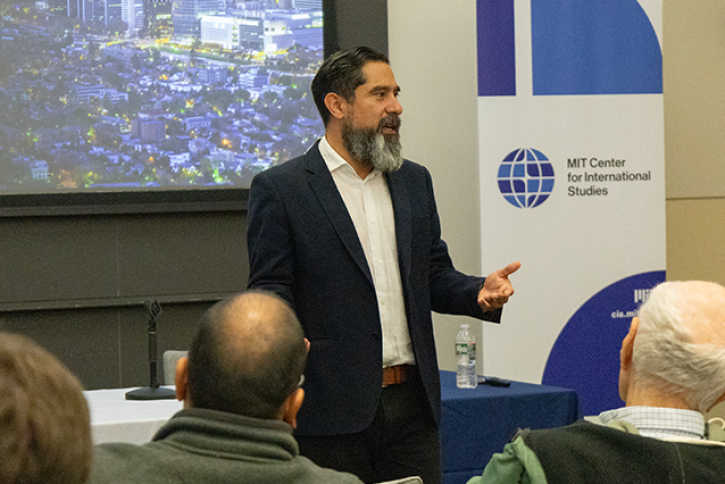
Cristóbal Bellolio presenting at “Beyond the Ballot: Chile’s Ongoing Political Transformation.”
As part of the “Focus on Latin America” series at the Center for International Studies, the MIT-Chile Program recently hosted Chilean scholar Cristóbal Bellolio for a talk titled “Beyond the Ballot: Chile’s Ongoing Political Transformation.” The event brought together faculty, researchers, graduate and undergraduate students, and members of the broader community interested in Latin American politics.
Bellolio, a political theorist and faculty member at Universidad Adolfo Ibáñez, explored Chile’s evolving political landscape in the years following the country’s 2019 social uprising and constitutional reform efforts. He discussed the challenges facing Chile’s democratic institutions, the rise of new political movements, and the broader regional context shaping Chile’s current moment.
“We are witnessing a transformation that cannot be reduced to election day,” Bellolio explained to the audience, emphasizing that the shift in Chilean politics goes beyond the ballot box.
The Estallido Social — What happened?
Bellolio began by recounting the Estallido Social (social uprising) of 2019, a pivotal moment triggered by widespread protests over issues such as inequality, the high cost of living, and social exclusion. The unrest quickly spread nationwide, reflecting deep-seated frustrations with Chile’s economic model and political system. The protests forced a reckoning within Chile’s institutions and public discourse about what democracy should deliver.
Constitutional process and reforms
In the aftermath, Chile undertook two ambitious constitutional drafting efforts between 2020 and 2023. The first draft was overwhelmingly rejected in 2022, followed by a second proposal that also failed in a 2023 referendum. Bellolio argued that both rejections reflected a public unwillingness to endorse sweeping change without consensus and broad legitimacy.
“The fact that both proposals failed is not a defeat — it is a demand for more deliberation, more inclusion, and more clarity in the political project,” he observed.
These rejections have recalibrated expectations for constitutional reform in Chile, signaling that future attempts must balance ambition with broad-based legitimacy.
Shifts in party politics
Bellolio traced the erosion of Chile’s traditional left–right alignment, pointing to the rise of new political movements such as Frente Amplio and the Republican Party. These forces have disrupted conventional alliances and introduced greater ideological polarization and fragmentation into Chile’s party system.
He noted that these new actors reflect generational shifts and dissatisfaction with elite politics, but they also pose challenges for building stable coalitions. Traditional parties in Chile must now navigate this more competitive and uncertain terrain.
Economic challenges, social demands, and security
Economic pressures remain at the heart of Chile’s political tensions. Bellolio explained that, following the defeat of the first constitutional reform attempt, President Boric’s coalition recalibrated its priorities to address the rising cost of living and public demands for pension reform, health care, and social safety nets through a more traditional political approach.
At the same time, public security has emerged as a pressing concern. Crime, perceptions of lawlessness, and urban violence weigh heavily on citizens, complicating policymaking for any governing coalition. Bellolio argued that without addressing these security challenges, political reforms may fail to build trust across Chilean society.
The presidential campaign ahead
Looking ahead, Bellolio surveyed the landscape leading up to Chile’s next presidential election. He identified several leading candidates and suggested that the race is shaping into a contest not just over policy, but over the very identity and direction of Chilean democracy.
“Whoever wins needs to speak to both the demand for change and the need for stability,” Bellolio said.
While two candidates have emerged as early frontrunners, Bellolio noted growing momentum behind a right-wing contender who promises reform without disruption. He cautioned, however, that an extreme or populist candidate could bring a new chapter of challenges to Chile’s political landscape.
Overall, Bellolio’s talk painted a picture of a country at an inflection point. Chile’s struggle to redefine its social contract, rebuild trust in institutions, and deliver on democratic expectations creates both opportunity and uncertainty for its next chapter. For MIT’s community of scholars and students interested in Latin America, the lecture underscored the importance of studying political transformation not just at the ballot box, but in the systems, narratives, and tensions that shape what democracy means.

